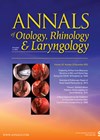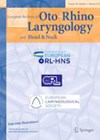
Journal Reviews
Is Gamma Knife Surgery effective for intracanalicular vestibular schwannomas?
Vestibular schwannomas (VSs) are rare, occurring in approximately five per 100,000 adults a year. In circa 8% of cases, the VS is contained within the internal auditory canal, i.e. intracanalicular (iVS). Although radiosurgery is a recognised treatment modality for VSs,...
Metrics to evaluate post-ACDF dysphagia
The authors performed a literature review to evaluate the current classification metrics for quantifying dysphagia after anterior spine surgery and, specifically, cervical discectomy and fusion (ACDF). They selected 19 articles after reviewing literature from 2005 to 2021. The result of...
What is the quality of patient-reported outcomes of salivary function?
Salivary gland dysfunction has multiple causes and can have significant impact on quality of life, particularly when symptoms are severe. There are several patient-reported outcomes (PROMS) that assess these issues; however, these are variable in what they measure. This systematic...
It is all so COSI…
Something which we have realised for a long time in the UK is the importance of the clinician in the assessment and long-term adoption of hearing aids. This common sense article outlines the need for more individualised patient pathways, thinking...
How do objective ratings of swallowing compare with patient-reported dysphagia QOL measures in the head and neck cancer population?
Swallowing may be assessed by a comprehensive battery of tools including instrumental/objective assessments, clinician-rated measures and patient-reported measures. The authors of this paper use secondary analysis to explore concordance between videofluoroscopy and a patient-reported dysphagia quality of life (QOL) measure....
Does sleep quality improve when we adequately treat CRS?
In addition to the well-known symptoms associated with chronic rhinosinusitis (CRS), patients often suffer with poor sleep quality which is also detrimental to health and wellbeing. This meta-analysis looked at 35 papers reporting outcomes for CRS patients post surgery on...
Should we be utilising the pre-lacrimal approach for maxillary sinus inverted papilloma?
For some time now, gold standard management of the maxillary sinus inverted papilloma has been endoscopic medial maxillectomy (EMM). Recently the endoscopic prelacrimal recess approach (EPLRA) has been reported to provide good access whilst preserving the nasolacrimal duct and inferior...
Gastrostomy tube dependence following TORS
Transoral robotic surgery (TORS) for oropharyngeal squamous cell carcinoma (OPSCC) is now a well-established treatment modality for early (T1-T2) disease. Accumulating evidence suggests that one of its main benefits relative to conventional chemoradiotherapy is superior long-term functional outcome, especially with...
Predicting the nature of swallowing deficits caused by surgical resection of the tongue?
Patients treated surgically for cancer of the tongue are expected to have difficulty in eating, drinking and swallowing. The authors of this paper report on a cohort of 106 patients in their practice who had surgical resection as primary treatment....
Sublingual gland tumour resection
This paper from South Korea analyses the pathology arising from 20 malignant sublingual gland tumours. Adenoid cystic carcinoma followed by mucoepidermoid carcinomas were the most common. Tumour invasion into the lingual nerve was detected in 40% of cases, and into...
How much does FESS improve the sense of smell?
We are all familiar with patients who undergo a seemingly successful FESS but, in spite of this, have persistent smell dysfunction postoperatively. This study compares a surgical group with a control group, measuring olfactory function pre and postoperatively using Sniffin...
Preoperative prediction of pain outcomes in patients with trigeminal neuralgia
The authors of this retrospective study have developed a preoperative trigeminal neuralgia (TN) grading system for the preoperative prediction of long-term pain relief after microvascular decompression (MVD). Patients who had become refractory to or developed toxicity to carbamazepine or oxycarbamazepine...
















